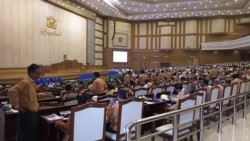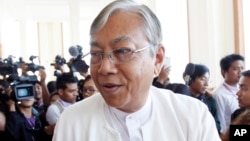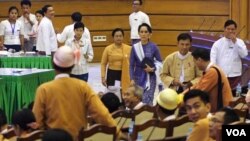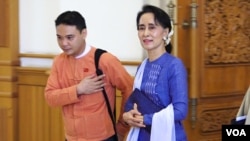In Myanmar’s lower house of parliament Friday Htin Kyaw, an unelected retired bureaucrat from the National League for Democracy (NLD), trounced the country’s incumbent vice president, Sai Mauk Kham, in first-round balloting to move a step closer to the presidency.
Htin Kyaw outpaced Sai Mauk Kham, 274 to 29, in first-round balloting.
It was the latest exercise in democracy as Aung San Suu Kyi’s party prepares to take the reins of government from President Thein Sein in a ceremony on March 30 that will end decades of military dominance.
The Nobel laureate led lawmakers in voting Friday for her handpicked candidate. He is virtually assured of becoming president next week, when both houses of parliament meet to choose the head of state and two vice presidents.
Htin Kyaw was rarely a newsmaker prior to this week. Until now, his biggest claim to fame was perhaps being the first person sent abroad by Yangon University, to study computer science in 1971.
Aung San Suu Kyi’s proxy for the presidency, however, is well known in the NLD inner circle. He is on the party’s executive committee and is married to lawmaker Su Su Lwin, daughter of an NLD co-founder.
But most lawmakers and observers are disappointed she could not find a way around the constitutional prohibition against anyone becoming president who has children with foreign citizenship, as she does.
“I really feel a little bit sorry for her,” said foreign affairs ministry trainee Khin Thidar Zin after she watched Tuesday’s parliamentary voting from the upper observation deck. “But I hope [Htin Kyaw] will be a kind president for the citizens of Myanmar.”
Aung San Suu Kyi, who has declared she will retain ultimate power, and her handpicked president will not have totally free hands to run Myanmar, as the military automatically holds one-quarter of the parliamentary seats and will control several key ministries.
The army’s candidate for president, General Myint Swe, who is the Yangon regional chief minister, will almost certainly lose next week’s parliamentary vote, but is guaranteed one of the two vice presidential posts.
The 64-year-old confidant of former dictator Than Shwe, who remains influential in the army, led military intelligence from 2004 to 2006. After retiring from military service in 2010, Myint Swe ran for parliament in a general election, and observers say his selection is an ominous sign for the upcoming civilian government. Myint Swe is believed to have been behind the 2007 saffron revolution crackdown and is also suspected of orchestrating violent arrests of activists in Rangoon during outgoing President Thein Sein’s rule.
Lawmakers of the NLD, which swept last November’s general election, are hopeful this is a win-win situation that will appease the generals who have kept a grip on power for more than half a century.
“Even though we are not a democratic country we are moving very fast toward a country where democracy flowers,” NLD lawmaker Zaw Thein told VOA.
With just weeks to go before the change of government, lawmakers from the Union Solidarity and Development Party, who until recently were dominant, seem to be gracefully accepting their new minority status.
“This is a choice of citizens. I have to accept the result of the vote of elected members of parliament who are representing citizens,” USDP lawmaker Ko Ko Naing told VOA after Friday’s lower-house vote. “Based on what I’ve learned about Htin Kyaw’s biography I believe he could be a qualified leader who can run the country well."
A combined session of both parliamentary houses next Tuesday, including the military’s appointed members who met on their own this week, is scheduled to select the president, with the second- and third-place finishers becoming vice presidents.
The NLD’s Henry Van Thio is likely to capture more votes than the military’s nominee for the first vice president spot. Aung San Suu Kyi told NLD lawmakers Monday evening she chose the Christian lawmaker, an ethnic Chin, for “national reconciliation.”
Myanmar, also known as Burma, is a Buddhist-dominated country of more than 55 million people that has been afflicted with nearly constant civil war since the end of British colonial rule in 1948.
Since a nominally civilian government was installed in 2011 there has been progress in brokering peace deals with various groups. But low-intensity conflicts continue between the Myanmar army and a number of armed groups.
Some information for this report came from VOA's Burmese Service.









